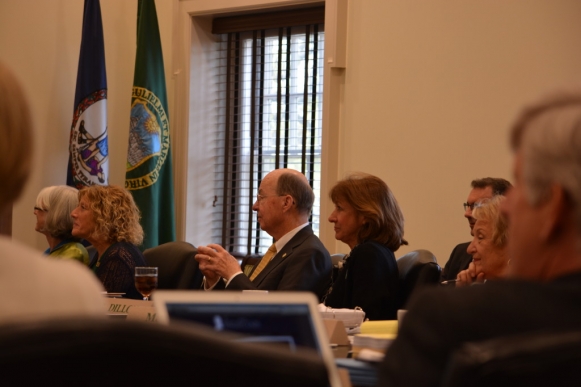Nearly two-thirds of black faculty feel that they are not treated fairly according to a 2015 faculty survey. Vice President of the Faculty Assembly Cathy Forestell delivered the results of the survey to the Board of Visitors in late September.
The survey conducted during the fall of 2015 showed that 64 percent of black faculty disagreed with the claim that employees are treated fairly without regard to race, color or national origin, while only 18 percent agreed with it.
The survey also showed a high rate of dissatisfaction among black faculty. 60 percent of black faculty responded that the College does not care about all employees or treat them fairly, while 30 percent felt that the College does.
White people and non-black people of color had different responses in the survey: an average of 53 percent agreed and 15 percent disagreed with the claim that the College cares about all employees and treats them fairly.
An average of 63 percent agreed and 16 percent disagreed with the claim that employees are treated fairly without regard to race, color or national origin.
Forestell, who in addition to her position in the Faculty Assembly is a psychology professor at the College, said that the survey is as an integral tool for the Assembly’s work. Forestell explained that the survey is done completely in-house, and is voluntarily designed, administered and analyzed by members of the Assembly.
Of the College’s 632 full-time instructional staff, 19 are black or African-American, according to 2013 data from the Office of Institutional Research.
Eleven Black faculty members responded to the survey, indicating that these sentiments are representative of over half of the black person-of-color portion of the instructional staff population.
Forestell said that the Faculty Assembly is very concerned about these results.
She emphasized the need to listen to the voices behind the numbers.
“If we don’t listen to them, how are we going to make our hiring more diverse?” Forestell said.
Chief Diversity Officer Chon Glover said that in collaboration with the President’s Task Force on Race and Race Relations, College administrators are looking into hiring an outside facilitator to administer focus groups that will dig deeper into specific issues that black faculty face and how to go about solving those problems.
Currently, the Task Force is launching a $1 million initiative to recruit and hire more diverse staff, beginning with mandatory diversity training for faculty and staff and investing more money into additional staffers for the Office of Diversity.
English, linguistics, community studies and education professor Charity Anne Hudley said that being a faculty member of color can be an alienating experience.
“It can be lonely,” Hudley said. “It can be intellectually lonely, socially lonely.”
According to Hudley, one of the most important parts of academia is collaboration, especially between faculty.
She said that she asks her colleagues to ask themselves, “Have I collaborated with one of my African-American colleagues?”
Hudley also said that it is important to think about the types of classes and disciplines that professors of color are seen in.
Hudley said that as a professor who teaches social justice and community studies classes, she has observed that students tend to self-select into her classes rather than having to take it for a major or a GER.
According to Hudley, these classes tend to be small and the students in these classes tend to be more conscious of racial tensions.
“My experience, which has been primarily positive, therefore might not represent all black faculty,” Hudley said.
Hudley said that another issue of race in academia is that some people underestimate or presume incompetence in their colleagues of color.
“Do colleagues appreciate each other’s work, or what they teach,” Hudley said. “Black academics tend to publish in different journals and focus on different issues in their research than white academics or non-black academics of color. There’s more of a thematic focus on community, justice and outreach. Scholars need to appreciate these differences.”
While the Task Force on Race and Race Relations has allocated funding for the prioritization of hiring racially-diverse faculty, Glover, Hudley and Forestell agreed that there was still one thing that would improve the climate of race in academia at the College.
“I think Anne [Charity Hudley], Chon [Glover] and I would all agree that diverse hiring is important, but also creating an environment of inclusion on campus is important as well,” Forestell said in an email.

